Jefferson Bible
|
| updated |
Copy Link Code
|
 Thomas Jefferson, the renowned intellectual polymath of colonial America and the early United States, held religious views that reflected a progressive and scientific background of his education in the theories of European Enlightenment. Although Jefferson often referred to himself as a Unitarian, the views he demonstrated were heavily influenced by the philosophy of Deism that had been born in Europe a century before. Deism holds that observation of the natural world through science and reason can prove the existence of a divine Creator without the effects of organized religion; furthermore, most Deists did not believe that this Creator would interfere in human affairs or suspend the laws of the universe. When Jefferson assembled his edition of the Gospels in the latter years of his life, which he titled The Life and Morals of Jesus of Nazareth (though it is generally known as the Jefferson Bible), he removed almost all the references to miraculous or supernatural details as well as any dogmatic statements. Although he never published the work in his time, likely for fear of controversy, Jefferson had nonetheless demonstrated his Deist inspiration.
Thomas Jefferson, the renowned intellectual polymath of colonial America and the early United States, held religious views that reflected a progressive and scientific background of his education in the theories of European Enlightenment. Although Jefferson often referred to himself as a Unitarian, the views he demonstrated were heavily influenced by the philosophy of Deism that had been born in Europe a century before. Deism holds that observation of the natural world through science and reason can prove the existence of a divine Creator without the effects of organized religion; furthermore, most Deists did not believe that this Creator would interfere in human affairs or suspend the laws of the universe. When Jefferson assembled his edition of the Gospels in the latter years of his life, which he titled The Life and Morals of Jesus of Nazareth (though it is generally known as the Jefferson Bible), he removed almost all the references to miraculous or supernatural details as well as any dogmatic statements. Although he never published the work in his time, likely for fear of controversy, Jefferson had nonetheless demonstrated his Deist inspiration.
Thomas Jefferson began to formulate the idea for his Deist version of the Gospels while he was in the midst of his first term as President of the United States. In 1804, he described his work on the Gospels in a letter to John Adams, saying that he had extracted the most pure teachings of Jesus' philosophy without any of the machinations of priestly orders added throughout the centuries. This early version of the Thomas Jefferson Bible did not satisfy its author, who decided that a more precise edition was in order. The manner in which he crafted the final edition would have certainly been just as controversial; Jefferson used a razor to cut out sections of different Gospels so that he could shift them into a single, chronological narrative devoid of any miracles or references to the divinity of Jesus Christ. Some aspects of Christian theology included in Jefferson's edition were the stories of Noah's Ark and the Great Flood, as well as the Resurrection, Heaven, Hell and the Devil. Although he completed Life and Morals in 1820, Jefferson was wise to only share the work with close friends and fellow Deists.
In 1895, the National Museum published Thomas Jefferson's Bible based on an edition provided by his grandson, Thomas Jefferson Randolph. Beginning in 1904 and lasting through the 1950's, every new member of Congress received a personal copy of the Jefferson Bible. The influence of Thomas Jefferson and the Bible version he drafted exists on both sides of the political spectrum today. Libertarians might draw on the independence of Jefferson's views from the oppressive theocratic monarchies of the time, while liberals can also observe the secularism apparent in his work. The Smithsonian has recently opened new exhibits and produced a television documentary on Thomas Jefferson's edition of the Gospels, including the source books from which he selected pages.
